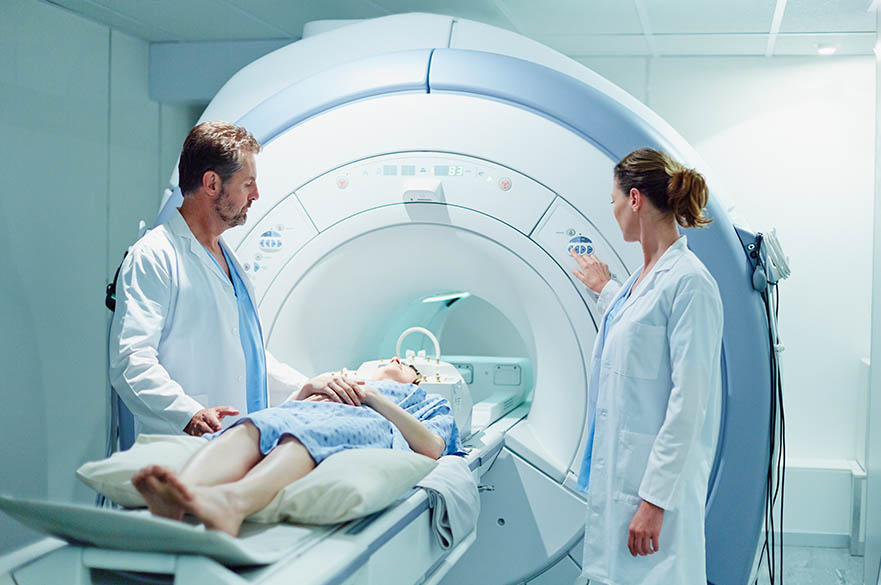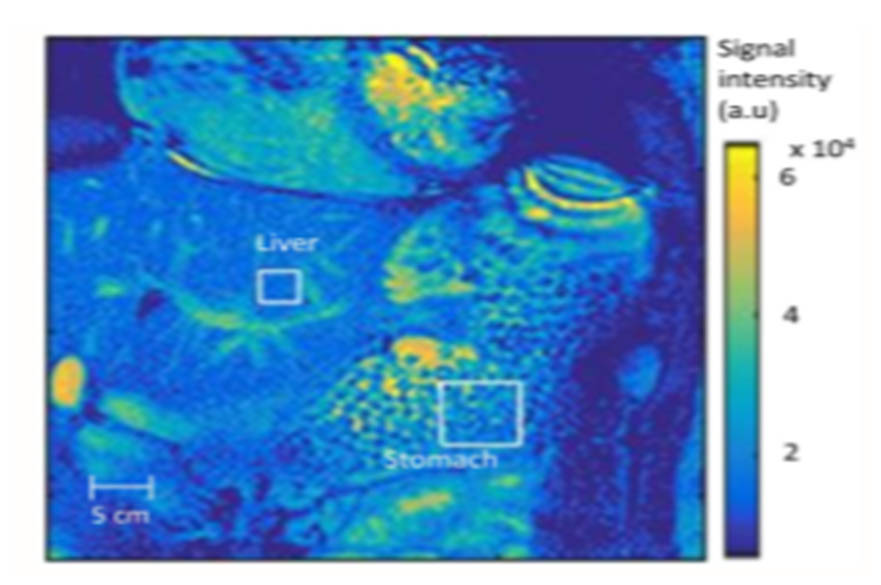Meal of microbubbles diagnoses digestive disorder
A revolutionary method using MRI to diagnose a chronic digestive disorder has been developed by researchers at Nottingham Trent University.
By Emily Oakden | Published on 30 October 2019
Categories: Press office; School of Science and Technology;

A revolutionary method using MRI to diagnose a chronic digestive disorder has been developed by researchers at Nottingham Trent University.
The research focuses on functional dyspepsia, a form of indigestion which affects up to 40% of people annually causing stomach pain, nausea, bloating and belching.
The pioneering approach involves the patient eating a meal containing microbubbles in order to measure the pressure exerted by the stomach with MRI.

MRI scan showing bubbles in stomach
Currently, sufferers of this disease are often sent for an invasive endoscopy procedure, using a resource that could be looking for cancer.
The study found that pressure could be measured in MRI scanners using microbubbles which are consumed by the patient in a form of a meal similar to bubble tea.
The research has been led by Martin Bencsik, associate professor in physics at Nottingham Trent University, whose research involves looking at innovative ways to measure pressure by means of using an MRI scanner.
It is hoped that this is the first step towards developing a way to use MRI scans to show pressure in other areas of the body- something that would be particularly useful in the treatment of conditions such as stroke.
“MRI is one of the most versatile imaging techniques with an astounding range of capabilities,” said Dr Bencsik, who is based in Nottingham Trent University’s School of Science and Technology.
He said: “We are thrilled at the prospect of enhancing MRI with yet one more new strength and are excited to see where else this research could lead.
“Our technique is the first ever to offer the possibility of assessing the pressure that the patients’ stomach exerts on the ingested meal in a totally non-invasive way.”
The research, published in the journal Magnetic Resonance in Medicine, also involved the University of Nottingham and City, University of London.
Notes for Editors
Notes to editors:
Press enquiries please contact Emily Oakden, Communications Executive, on telephone +44 (0)115 848 5376, or via email, or Dave Rogers PR Manager, on telephone +44 (0)115 848 8782, or via email.
About Nottingham Trent University
Nottingham Trent University (NTU) was named University of the Year 2019 in the Guardian University Awards. The award was based on performance and improvement in the Guardian University Guide, retention of students from low-participation areas and attainment of BME students. NTU was also the Times Higher Education University of the Year 2017, and The Times and Sunday Times Modern University of the Year 2018. These awards recognise NTU for its high levels of student satisfaction, its quality of teaching, its engagement with employers, and its overall student experience. The university has been rated Gold in the Government’s Teaching Excellence Framework – the highest ranking available.
It is one of the largest UK universities. With nearly 32,000 students and more than 4,000 staff located across four campuses, the University contributes £900m to the UK economy every year. With an international student population of more than 3,000 from around 100 countries, the University prides itself on its global outlook. The university is passionate about creating opportunities and its extensive outreach programme is designed to enable NTU to be a vehicle for social mobility.
NTU is among the UK’s top five recruiters of students from disadvantaged backgrounds. A total of 82% of its graduates go on to graduate entry employment or graduate entry education or training within six months of leaving. Student satisfaction is high: NTU achieved an 87% satisfaction score in the 2019 National Student Survey.
NTU is also one of the UK’s most environmentally friendly universities, containing some of the sector’s most inspiring and efficient award-winning buildings.
It is home to world-class research, and won The Queen’s Anniversary Prize in 2015 – the highest national honour for a UK university. It recognised the University’s pioneering projects to improve weapons and explosives detection in luggage; enable safer production of powdered infant formula; and combat food fraud.